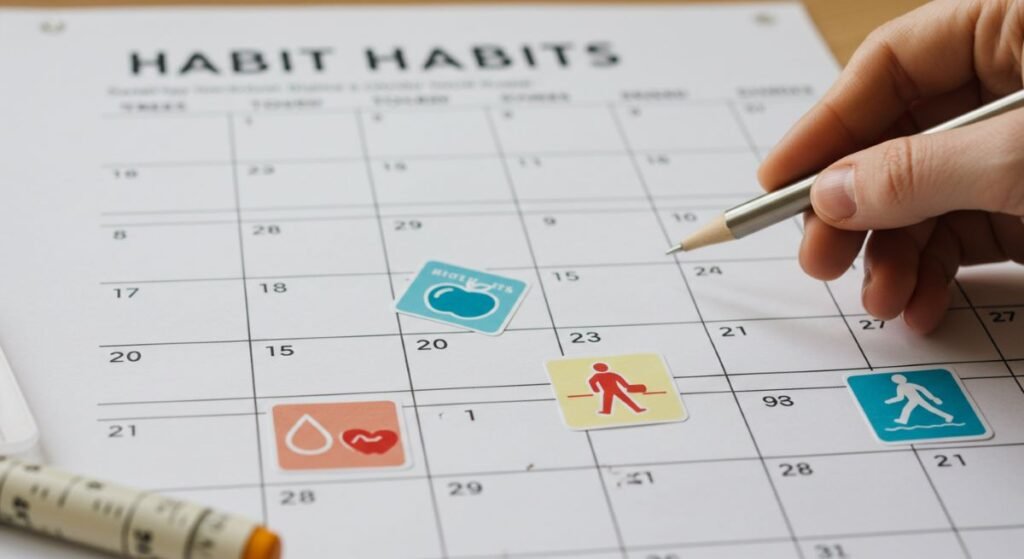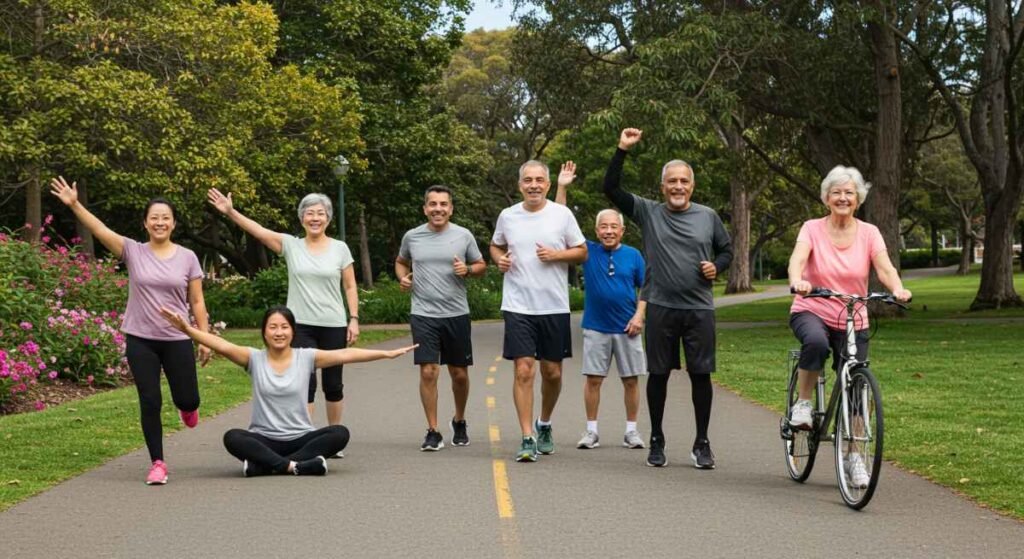Introduction
Adopting a sustainable healthy lifestyle is one of the most valuable investments you can make in your long-term well-being. Rather than relying on temporary diets or extreme routines, the goal is to develop lasting habits that support your physical, mental, and emotional health. In this beginner’s guide, we’ll walk you through the essential steps to transform your daily life in a manageable and realistic way.
Sustainable Healthy Lifestyle: A Guide to Healthy Foods and Habits
What Sustainable Healthy Lifestyle Truly Means
Living a sustainable healthy lifestyle is about more than just eating nutritious meals or hitting the gym. It’s about making mindful choices that nourish your body, mind, and soul in the long run. Whether you’re just starting or looking to make small changes, this guide will provide valuable insights into creating healthy habits and incorporating healthy foods into your routine. As the United Nations Environment Programme highlights, ‘Sustainable lifestyles are ways of living, social behaviors, and choices that minimize environmental degradation while supporting equitable socio-economic development and a better quality of life for all‘ (source: UNEP).

What Does a Sustainable Healthy Lifestyle Really Mean?
At its core, a sustainable healthy lifestyle is not just about temporary fixes; it’s a mindset and a commitment to your well-being. It involves balancing healthy foods, staying active in ways that bring you joy, and understanding the importance of rest and relaxation. Sustainable living means making choices that can be maintained over time without feeling deprived or overwhelmed.
Nourishing Your Body with Healthy Foods
To maintain a healthy lifestyle, the foundation starts with the food you eat. It’s essential to prioritize healthy foods that fuel your body with the nutrients it needs. This includes incorporating whole grains, fruits, vegetables, lean proteins, and healthy fats into your diet. Eating real, unprocessed foods not only supports your body physically but also helps stabilize your energy levels and maintain mental clarity throughout the day.
Tip: Make small adjustments, like swapping processed snacks for fruits or nuts, to gradually improve your diet.
Staying Active with Enjoyable Activities
Exercise doesn’t have to mean hours at the gym. Healthy habits include finding physical activities you enjoy. Whether it’s a daily walk, a dance class, or yoga, staying active helps keep your body in optimal condition and boosts your mood through the release of endorphins. When activity is enjoyable, it’s easier to stick with it in the long term.
Fact: According to the American Heart Association, regular physical activity can reduce the risk of chronic diseases, improve mental health, and increase longevity.
Managing Stress for a Balanced Life
One often overlooked aspect of a healthy lifestyle is stress management. Chronic stress can have a negative impact on both your physical and mental health. Practices such as mindfulness, meditation, deep breathing, and engaging in hobbies can help manage stress levels and enhance your overall quality of life.
Tip: Start with a few minutes of deep breathing exercises or journaling to unwind each day.
Prioritizing Rest and Sleep
Getting enough quality sleep is just as important as eating well and staying active. Sleep plays a crucial role in recovery, brain function, and overall health. A sustainable healthy lifestyle includes good sleep hygiene, which means going to bed at a consistent time, creating a calming bedtime routine, and making your sleep environment as restful as possible.
Tip: Aim for 7-9 hours of sleep per night and avoid electronics before bedtime to improve sleep quality.
Sustainable Healthy Habits for Long-Term Success
Living a sustainable healthy lifestyle requires consistency, patience, and making choices that align with your long-term goals. By focusing on small, achievable steps, you can create healthy habits that become part of your routine, rather than temporary changes.
Gradual Changes for Lasting Results
Rather than making drastic changes overnight, focus on gradual improvements. Start by introducing one or two new healthy habits each week, whether it’s swapping a sugary drink for water or adding a 10-minute walk to your daily routine. By starting small, you set yourself up for long-term success without overwhelming yourself.
Building a Routine That Works for You
Your sustainable healthy lifestyle is personal to you. It’s about finding balance in a way that works with your life. Some days, you may prioritize rest, while other days, you might focus on exercise or healthy eating. The key is to find a balance that feels sustainable, where each habit supports the others and enhances your overall well-being.
Conclusion
Embracing a sustainable healthy lifestyle involves understanding that it’s about balance, consistency, and making long-term choices that align with your personal well-being. By focusing on healthy foods, staying active in ways that you enjoy, managing stress, and prioritizing rest, you can create a life that not only nourishes your body but also supports your mental and emotional health. Remember, small changes can lead to big results over time take it one step at a time and celebrate your progress.
Start with Small, Actionable Changes for a Healthy Lifestyle
Adopting a sustainable healthy lifestyle is all about making gradual, consistent changes that stick. Trying to transform your entire life overnight can be overwhelming and may lead to frustration. Instead, it’s best to focus on small, actionable changes that you can easily incorporate into your daily routine. This way, you can build momentum, stay motivated, and create long-lasting healthy habits that contribute to your overall well-being.

Why Start Small?
Making small changes is a more effective and sustainable approach than attempting drastic overhauls. When you focus on one or two healthy habits each week, you give yourself the time and space to adjust without feeling overwhelmed. Healthy lifestyle changes, especially those related to nutrition or exercise, should be gradual to ensure they are sustainable in the long run. For example, instead of committing to a drastic diet or extreme workout routine, try focusing on a manageable change, like drinking more water or walking a few extra steps each day.
Actionable Steps to Begin with
- Drink More Water: Staying hydrated is one of the easiest ways to enhance your healthy lifestyle. Start by adding an extra glass of water to your daily routine. Over time, this small change can lead to noticeable improvements in energy levels, digestion, and overall health.
- Go for a Walk After Dinner: Adding a short walk after meals is an excellent way to boost digestion and increase physical activity. This simple habit can also support better sleep and reduce stress levels.
- Cook at Home Twice a Week: Cooking at home allows you to have full control over the ingredients you use, ensuring that your meals are both nutritious and aligned with your health goals. Start by preparing homemade meals just a couple of times a week, then gradually increase the frequency.
The Power of Gradual Changes
The key to building a sustainable healthy lifestyle is consistency. By making small, healthy changes over time, you build habits that become part of your daily routine. This approach not only prevents burnout but also ensures that the changes you make are long-lasting. Moreover, it allows you to track your progress and adjust your habits based on what works best for you.
Benefits of Gradual Changes
- Less Stress: Small steps prevent feelings of being overwhelmed, allowing you to focus on one change at a time.
- Building Confidence: Each successful habit reinforces your commitment to living a healthier life.
- Long-Term Success: Gradual changes are more likely to stick and evolve into permanent habits.
Conclusion
Adopting a sustainable healthy lifestyle doesn’t have to mean making drastic changes all at once. By starting with small, actionable steps, you can create healthy habits that will serve you in the long term. Whether it’s drinking more water, going for a walk after dinner, or cooking at home, small changes will lead to lasting results and a healthier, happier life. Keep your focus on consistency, and remember that each step forward, no matter how small, is progress.
Eat Real, Nutrient-Dense Foods for a Healthy Lifestyle
One of the cornerstones of a sustainable healthy lifestyle is choosing healthy foods that nourish your body and provide the necessary nutrients for energy and overall well-being. Nutrient-dense foods are packed with vitamins, minerals, and essential nutrients, helping you stay energized and healthy throughout the day. Focus on consuming these real, whole foods most of the time to achieve a balanced, fulfilling, and sustainable approach to health.

The Power of Whole Foods
When you prioritize healthy foods, such as fruits, vegetables, whole grains, lean proteins, nuts, and seeds, you give your body the nutrients it needs to function at its best. These foods are naturally rich in fiber, antioxidants, and essential fatty acids, which promote good digestion, reduce inflammation, and support heart health. Whole foods are also less likely to cause energy crashes, unlike highly processed or sugary options that lead to sudden spikes and drops in blood sugar levels.
Why Choose Nutrient-Dense Foods?
- Sustained Energy: Unlike refined carbs or sugary snacks, nutrient-dense foods release energy gradually, helping you maintain steady energy levels throughout the day without the dreaded afternoon slump.
- Improved Digestion: Foods like vegetables, fruits, and whole grains are rich in fiber, which promotes healthy digestion and helps keep your gut microbiome balanced. This, in turn, contributes to better immune function and overall health.
- Better Mood and Mental Clarity: Nutrient-rich foods, such as lean proteins and healthy fats, support brain function and enhance mental clarity, helping you stay focused and sharp all day long.
Making Better Choices More Often
Maintaining a sustainable healthy lifestyle doesn’t mean being perfect all the time. The goal is to make better food choices more often. Instead of aiming for perfection, focus on progress by incorporating more whole, nutrient-dense foods into your diet gradually. You don’t need to cut out all indulgent foods; rather, it’s about balance. By consistently choosing nourishing options over highly processed ones, you’ll set yourself up for long-term success.
Tips for Making Healthier Food Choices
- Plan Your Meals: Take the time to plan your meals and snacks ahead of time, ensuring you have nutrient-rich options available throughout the day.
- Snack Smart: Swap out sugary snacks for whole food alternatives like nuts, fruits, or vegetables. These options provide a more sustained energy boost and help curb cravings.
- Cook at Home: Cooking at home allows you to control the ingredients and ensure that your meals are nutrient-dense and free from unnecessary additives.
The Benefits of Eating Real, Nutrient-Dense Foods
Adopting a diet rich in healthy foods and whole, nutrient-dense options provides numerous long-term health benefits. From improved energy levels to better digestion and enhanced mental clarity, these foods fuel your body and mind, contributing to a more vibrant, sustainable healthy lifestyle. Over time, these small, consistent changes will add up, helping you achieve lasting health and well-being.
Conclusion
To maintain a sustainable healthy lifestyle, it’s important to focus on eating real, nutrient-dense foods most of the time. By prioritizing fruits, vegetables, whole grains, lean proteins, and healthy fats, you nourish your body, support better energy levels, and improve overall well-being. Remember, it’s not about perfection it’s about making better choices more often, which will lead to lasting, positive changes for your health.
Move Your Body in Ways You Enjoy for a Healthy Lifestyle
In fact, regular physical activity plays a crucial role in maintaining a sustainable healthy lifestyle. It’s important to remember that exercise should never feel like a punishment. Instead, it should be an enjoyable and rewarding activity that you can easily integrate into your daily routine. Whether it’s dancing, swimming, yoga, hiking, or strength training, the key is to stay active in ways that feel fun and natural to you. By choosing activities you enjoy, you’re more likely to stick with them and reap the long-term benefits of physical movement. According to the American Heart Association, finding support from others in a fitness setting can make it easier to stay motivated and achieve long-term fitness goals (source: American Heart Association – Fitness Peer Support).

The Importance of Enjoyable Exercise
Engaging in physical activity not only improves your physical health but also boosts your mental well-being. When exercise feels like a chore, it’s hard to stay motivated. However, when you find activities that you genuinely enjoy, staying active becomes something you look forward to. Whether it’s the rhythm of dancing or the serenity of yoga, the emotional and mental rewards of moving your body are significant.
Benefits of Moving Your Body Regularly
- Improved Cardiovascular Health: Regular exercise helps strengthen your heart and improve circulation, reducing the risk of heart disease and stroke.
- Better Mental Health: Physical activity releases endorphins, which are natural mood boosters that help reduce stress and anxiety, promoting a healthier mindset.
- Enhanced Flexibility and Mobility: Activities like yoga and swimming increase flexibility, which is essential for maintaining good posture and reducing the risk of injury.
Finding Activities You Love
To build a sustainable healthy lifestyle, it’s crucial to discover activities that resonate with you. Not every workout needs to be intense or rigorous. The most important thing is to find something you enjoy and can sustain over time. Whether it’s a gentle walk in nature or a challenging hike, regular movement will support your overall health and well-being.
Tips for Staying Active in Enjoyable Ways
- Explore New Activities: Try different types of exercise until you find something you enjoy. From cycling to rock climbing, there are countless ways to stay active.
- Mix It Up: Variety keeps things interesting and prevents boredom. Alternate between low-impact exercises like yoga and higher-intensity activities like strength training.
- Set Realistic Goals: Start with small, achievable goals. This helps keep you motivated and allows you to see progress over time.
Consistency Over Intensity
While intensity is important, consistency is the key to long-term success in maintaining a sustainable healthy lifestyle. Aim to move your body regularly, even if it’s just for 15–30 minutes a day. Consistency will help you form lasting habits and improve your physical and mental health over time. Whether you prefer short, frequent sessions or longer, more intense workouts, the key is to make movement a part of your daily routine.
Conclusion
Incorporating regular movement into your daily routine is essential for a sustainable healthy lifestyle. The key is to find activities you enjoy so that staying active feels like a natural part of your life. Whether it’s dancing, hiking, or yoga, make exercise fun and consistent. Remember, consistency over intensity will help you stay on track and maintain a healthier, more vibrant lifestyle.
Prioritize Sleep and Recovery for a Healthy Lifestyle
A sustainable healthy lifestyle goes beyond healthy eating and regular exercise it also includes prioritizing quality sleep and proper recovery. Sleep is the foundation of both physical and mental health, playing a vital role in restoring your body, supporting cognitive function, and helping you feel energized for the day ahead. Without adequate rest, it’s challenging to maintain optimal performance in other aspects of your health.

The Importance of Sleep for Your Health
Quality sleep isn’t just about quantity; it’s about the quality of rest you get each night. Sleep allows your body to recover from daily stresses, repair muscles, and regulate vital processes like metabolism and immune function. Without sufficient sleep, your overall health can suffer. Studies have shown that lack of sleep is linked to an increased risk of chronic conditions like obesity, heart disease, and diabetes (Harvard Medical School, 2020). Therefore, making sleep a priority is essential for a sustainable healthy lifestyle.
How Sleep Affects Your Physical and Mental Health
- Physical Recovery: Sleep plays a key role in repairing and rebuilding muscle tissues after exercise. During deep sleep, your body releases growth hormones that help with tissue repair and muscle growth.
- Mental Clarity: Adequate sleep supports cognitive function, memory retention, and focus. It helps your brain process and store information, improving your ability to concentrate and make decisions throughout the day.
- Mood Regulation: Sleep impacts your mood by helping balance stress hormones like cortisol. Poor sleep increases irritability and stress, which can affect your overall well-being.
Tips for Improving Sleep Quality
Creating a relaxing and restorative sleep environment can help enhance the quality of your rest. Here are some better sleep tips for getting the rest you need to thrive:
Create a Calming Nighttime Routine
- Reduce Screen Time: Exposure to blue light from phones, tablets, and TVs can interfere with your body’s ability to produce melatonin, the hormone responsible for regulating your sleep-wake cycle. Aim to turn off screens at least one hour before bed.
- Wind Down with Relaxing Activities: Incorporate activities that help calm your mind and body, such as reading, meditation, or taking a warm bath. This prepares your body for sleep by signaling that it’s time to wind down.
- Create a Sleep-Friendly Environment: Make your bedroom a sanctuary for rest. Ensure it’s dark, quiet, and at a comfortable temperature. Consider using blackout curtains and white noise machines to block out disturbances.
The Role of Rest Days in Your Health Routine
Rest days are as important as workout days in a sustainable healthy lifestyle. These recovery periods allow your muscles to rebuild and grow stronger, and they help prevent overtraining injuries. Whether you’re engaging in intense exercise or moderate activity, giving your body the time it needs to recover will ensure you can continue to stay active and healthy in the long term.
Why Rest Is Crucial for Your Fitness Goals
- Muscle Repair and Growth: During rest, your body undergoes muscle repair and growth. This is when you actually get stronger from your workouts.
- Mental Recharge: Rest days are important for recharging mentally as well. Taking a break from your routine can reduce stress and prevent burnout, ensuring that you maintain motivation in the long term.
- Preventing Injury: Overtraining without proper rest increases the risk of injury. Rest days allow your body to recover fully, keeping you injury-free and ready to perform at your best.
Conclusion
Prioritizing sleep and recovery is essential for a sustainable healthy lifestyle. With quality sleep and regular rest days, your body and mind can function at their best. Remember, it’s not just about the intensity of your workouts or the foods you eat; your sleep and recovery habits play a critical role in your overall health. By creating a calming nighttime routine and incorporating rest days into your schedule, you can enhance both your physical and mental well-being.
Manage Stress Mindfully
Stress management is a vital component of maintaining a sustainable healthy lifestyle. Chronic stress can negatively affect both physical and mental health, undoing the benefits of even the best health habits. Therefore, learning how to manage stress through mindful practices is essential for overall well-being. In this article, we will explore various techniques for stress management and how incorporating them into your daily routine can support a healthier, more balanced life.

The Impact of Chronic Stress on Your Health
Chronic stress can have detrimental effects on both your body and mind. It triggers the release of stress hormones like cortisol, which can lead to increased inflammation, weakened immune function, and mental exhaustion. Over time, unmanaged stress contributes to various health problems, such as anxiety, depression, heart disease, and even weight gain. Therefore, addressing stress in a mindful and effective way is crucial for a healthy lifestyle.
How Stress Affects Physical and Mental Health
- Weakened Immune System: Chronic stress weakens your immune system, making you more susceptible to illness and slower to recover.
- Heart Health: Stress increases blood pressure and can lead to cardiovascular problems, putting strain on your heart over time.
- Mental Fatigue: Constant stress can cause mental burnout, leading to difficulty concentrating, irritability, and reduced productivity.
Mindful Stress Management Techniques for a Healthier Lifestyle
Adopting mindful practices can significantly reduce stress levels and improve your overall health. Here are some healthy habits that can help manage stress effectively:
Breathing Exercises for Immediate Relief
Deep breathing exercises are an excellent tool for reducing stress. Taking slow, deep breaths activates your parasympathetic nervous system, which helps calm the body and mind. Try techniques like diaphragmatic breathing or the 4-7-8 method, which involves inhaling for 4 seconds, holding your breath for 7 seconds, and exhaling for 8 seconds.
Mindfulness Meditation for Long-Term Stress Reduction
Mindfulness meditation is a powerful tool for managing stress in the long term. By focusing on the present moment without judgment, mindfulness helps you become more aware of your thoughts and feelings, allowing you to respond to stress in a more controlled manner. Regular practice has been shown to reduce anxiety, improve sleep, and enhance emotional well-being.
Nature Walks for Physical and Mental Rejuvenation
Spending time in nature can have a calming effect on the mind. Research has shown that walking in natural environments can reduce cortisol levels, lower blood pressure, and improve mood. Try incorporating regular nature walks into your routine to give your body and mind a break from the hustle and bustle of daily life.
Journaling for Mental Clarity
Journaling is a simple yet effective way to process emotions and reduce stress. Writing down your thoughts and feelings can help you organize your thoughts, gain perspective, and release pent-up emotions. It can also promote mindfulness by encouraging reflection and self-awareness.
Creative Hobbies for Stress Relief
Engaging in creative activities like painting, knitting, or playing a musical instrument can provide a therapeutic outlet for stress. These hobbies allow you to focus on something enjoyable, giving your mind a break from stressors and helping you relax. Whether it’s crafting, cooking, or any other form of self-expression, creative hobbies can be a valuable tool for reducing stress and supporting a healthy lifestyle.
Benefits of Creative Hobbies
- Mental Focus: Creative hobbies demand your full attention, helping you forget about daily stresses and focus on something enjoyable.
- Emotional Expression: Engaging in creative activities allows you to express emotions in a non-verbal way, providing emotional release and clarity.
- Improved Mood: Creative outlets release dopamine, the “feel-good” neurotransmitter, which can improve your mood and overall sense of well-being.
How to Integrate Stress Management Into Your Daily Routine
For stress management to be effective, it needs to be incorporated into your daily life. Start by setting aside a few minutes each day for mindful practices, such as meditation, breathing exercises, or journaling. Additionally, make time for regular physical activity, which can help alleviate stress and improve mood. Remember, consistency is key—small, daily habits can have a significant impact on reducing stress over time.
Conclusion
Managing stress mindfully is a crucial aspect of a sustainable healthy lifestyle. By adopting mindful stress management techniques such as breathing exercises, meditation, nature walks, and creative hobbies, you can improve both your mental and physical health. Incorporating these habits into your daily routine will help you maintain a balanced, stress-free life. As you work on reducing stress, remember that your mental health is just as important as your physical health, and taking care of both is essential for overall well-being.
Build a Supportive Environment
Lastly, creating a supportive environment is essential for maintaining a sustainable healthy lifestyle. Surrounding yourself with people who encourage and support your health goals can significantly increase your chances of success. In this article, we’ll explore how building a supportive environment at home, at work, and in your social circles can help reinforce your commitment to healthy habits and lifestyle choices.

The Power of a Positive Environment
A supportive environment acts as a catalyst for achieving healthy habits. Whether it’s through your family, friends, or social networks, being around people who share similar health goals can motivate you to stay on track. Furthermore, a positive environment makes it easier to make healthier choices, reducing the temptation to revert to old habits.
Social Influence on Healthy Choices
Research shows that people are highly influenced by the behaviors and habits of those around them. According to a study published by the American Journal of Public Health, individuals who have social support for their health goals are more likely to stick with healthy behaviors. Having a support system can help you stay motivated, accountable, and encouraged as you work toward a healthier lifestyle.
How to Build a Supportive Environment
Building a supportive environment doesn’t happen overnight. It requires effort and intentionality. Here are some practical steps to help create a positive environment that encourages your sustainable healthy lifestyle:
Surround Yourself with Like-Minded People
Join groups or communities that share your health interests, whether it’s a fitness class, a healthy cooking group, or an online health forum. Being part of a group that shares similar goals can inspire and motivate you to maintain your healthy lifestyle. You can exchange tips, share progress, and support one another on your wellness journeys.
Follow Inspiring Health Content
In today’s digital age, social media and online communities can be powerful tools for support. Follow fitness experts, nutritionists, and health influencers who inspire you. Their content can provide daily motivation, ideas for healthy meals, and exercise routines that align with your goals. Surrounding yourself with positivity and knowledge is a great way to stay on track.
Cook and Eat with Family or Friends
Preparing healthy meals together with family or friends is not only a fun way to bond but also a great way to reinforce your healthy food habits. Cooking at home allows you to control the ingredients and make healthier choices. When you enjoy the process with loved ones, it becomes a sustainable and enjoyable routine, rather than a task.
The Benefits of a Supportive Environment
When you create a supportive environment, you set yourself up for long-term success. The following are just a few benefits of having a positive network around you:
Increased Accountability
Being surrounded by people who care about your health journey makes you more accountable for your actions. Whether it’s sticking to a workout schedule or choosing healthier foods, the support of others can help you stay focused and on track.
Emotional Support
Embarking on a sustainable healthy lifestyle can sometimes be challenging. Having friends and family who encourage you during tough moments can help alleviate stress and emotional burdens. Knowing that you’re not alone in your journey can give you the strength to keep moving forward.
Long-Term Motivation
A supportive environment can also help you maintain your motivation over time. With regular encouragement, feedback, and shared experiences, you’re more likely to stay consistent in your efforts, making it easier to stick to a healthy routine in the long run.
Take Action: Start Building Your Support System Today
Creating a supportive environment is a key element in sustaining a healthy lifestyle. Whether it’s reaching out to friends, joining health-focused communities, or following inspiring health content, taking the time to build your network of support can make a big difference in achieving your goals. Start today by identifying one person or group that can provide the encouragement you need to succeed in your wellness journey.
Conclusion
In summary, building a supportive environment is an essential step towards maintaining a sustainable healthy lifestyle. Surrounding yourself with people who share similar goals, seeking inspiration from health-focused content, and engaging in activities like cooking with family all contribute to a positive, motivating atmosphere. By taking deliberate steps to build a supportive environment, you’ll make it easier to stay on track with your health goals and lead a fulfilling, healthy life.
Sustainable health isn’t about perfection it’s about progress. By making consistent, intentional choices, you can create a sustainable healthy lifestyle that supports energy, longevity, and happiness.






